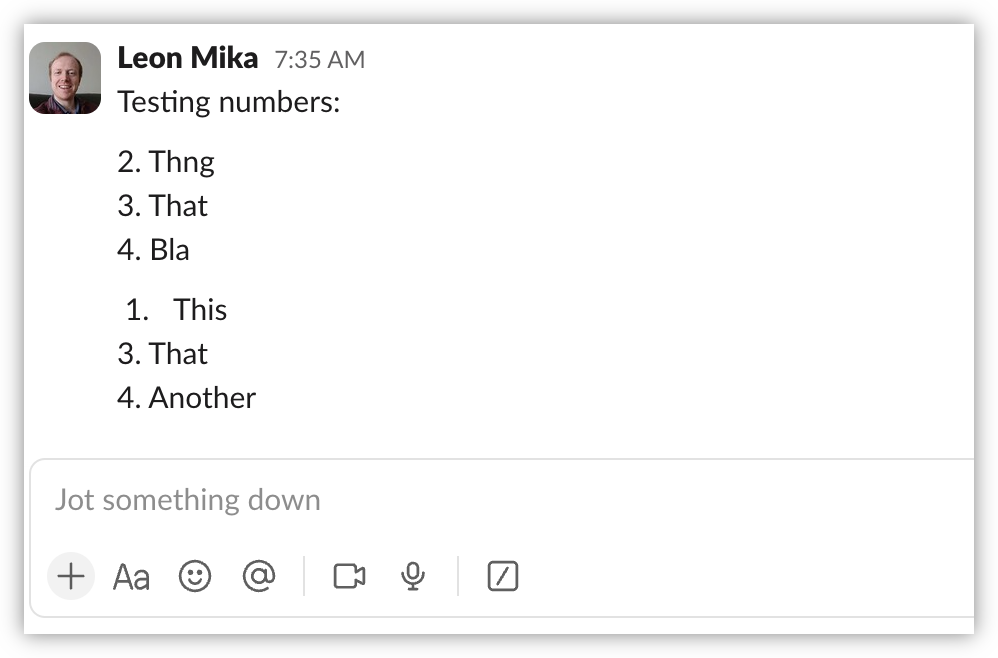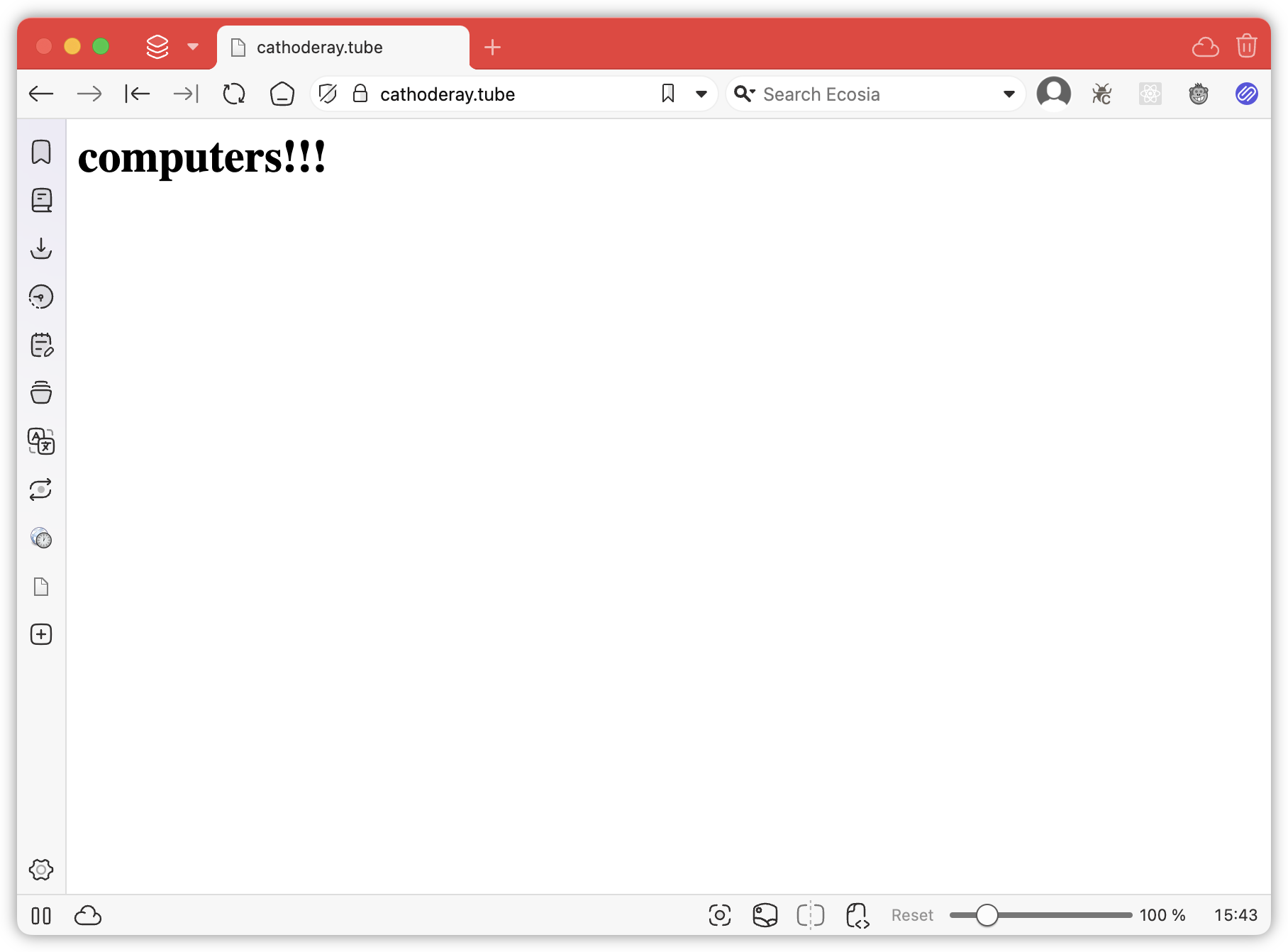-
🔗 82MHz: Blogs are still a thing
One more for the “blogging’s not dead yet” list everyone’s keeping.
Blogging is a small niche these days. There isn’t much hype around it, nor is there any money to be made because the VC firms are all busy chasing the next big thing […] But it is still here, and I like it exactly because it’s not the hype technology of the day anymore. It isn’t commercialised, algorithmically curated and set up to make some other person rich.
That’s why I like it too. It’s a slow, quiet, and comfortable form of online interaction.
Via: Mastodon boost by Brent Simmons
-
🔗 MOR10: Blogging is dead. Long live ephemerality.
This ended up being quite an insightful piece, particularly around how much better the authoring tools are in Instagram and other social media apps.
Via: Juha-Matti Santala
-
🔗 Robert Birming: Blog Inspiration
Very nice collection of links to blogging resources — from ideas and inspirations through to colour and icon packs — from @birming. This stuff is cat nip for me, so I’m sure to enjoy browsing these links.
-
🔗 You’re not a front-end developer until you’ve… - Nic Chan
Scored 17 in this little quiz. Not bad for a backend developer, although many of the questions universally apply.
Via: Jim Nielsen’s Notes
-
🔗 Science: Cockatoos have learned to operate drinking fountains in Australia
Each placed one or both of its feet on the fountain’s twist handle, then lowered its weight to twist the handle clockwise and prevent it from springing back up.
Amazing.
-
🔗 Dan Sinker: The Who Cares Era
This post has been doing the rounds in the online circles I travel in. I finally got around to reading it, and I think the author is right: caring about something in a world where others don’t is a radical idea. I know it’s an area where I could be better.
Oh, and I’m sorry, but I find the term “Instagram mini-essay” to be an oxymoron. The original poster’s quip of this Instagram essayist being another victim of the Who Cares Era are my feelings exactly. I mean, come on: don’t use frickin’ Instagram for your think pieces. Put a frickin’ URL on it next time.
-
I stopped working this day in 2025, almost 41 years later, as a senior engineer (which is surprisingly a lot like busing tables — lots of cleanup and setting the table just right for the customers to have a great time).
This line made me laugh. I’ve never waited tables, but as a senior dev myself, it often feels that my job has become less about coding and more about fixing problems and getting out of people’s way. So it goes.
Congratulations, Brent Simmons, on your retirement.
-
🔗 Jim Nielsen: Notes from Andreas Fredriksson’s “Context is Everything”
What really resonates in his step-by-step process is how, as problems present themselves, you see how much easier it is to deal with performance issues for stuff you wrote vs. stuff others wrote. Not only that, but you can debug way faster!
The understanding that comes from the code you wrote yourself is grossly underrated in my opinion. Choosing to use a library for something is not free. There’s an exchange involved: speed now for understanding later.
-
🔗 Flamed Fury: Monthly Recap: May 2025
I found the bookmarks from this monthly recap to be really interesting.
-
🔗 Simon Willison: No build frontend is so much more fun
If you’ve found web development frustrating over the past 5-10 years, here’s something that has worked worked great for me: give yourself permission to avoid any form of frontend build system. […] The joy came flooding back to me! It turns out browser APIs are really good now.
None of my frontend projects are used for “real” things, so I’m not speaking from authority here. But I don’t care: I still think the worst part of frontend development are all the crummy build tools. Remove them all and web development can be really fun.
-
🔗 Birchtree: Apple copies Samsung 😉
It has been fundamentally strange that Apple currently has OS’s with the same features that rarely share a number, so numbering them by year makes sense.
Wait, I was under the impression that Apple’s practice of trying to jam the same features into their OSes at the same time had a detrimental effect on quality. And they’re going to synchronise all their OS version numbers? Wouldn’t that just solidify user’s expectation on what’s in those OSes? Why not avoid that by keeping individual version numbers, and just ship features when they’re ready?
-
🔗 Inessential: My Wildly Incorrect Bias About Corporate Engineers
I was impressed, and grew more impressed as time went on, by my fellow engineers’ rigor, talent, professionalism, care, and, especially, ability to work with other people toward common goals.
As someone who has only worked in mid-sized businesses (and government) I appreciate Brent Simmons — a developer who I admire and whose software I use every day — candour here. Admitting your biases is not easy.
I know the indie life is romantic. Believe me, nary a day passes where I don’t romanticise about it. But speaking for myself, I think people’s reluctance to go that route is less to do with ability and more to do with the non-technical side, like security, confidence, thinking you have a good idea (not to mention being simply being in a position to take that opportunity). I wonder if some day the stars will align and I’d be in a position to take the plunge. Time will tell, I guess.
-
🔗 Pixel Envy: The Future of British Television in a U.S. Streaming World
The BBC has problems, but it matters to people. If a country values its domestic media — particularly public broadcasting — it should watch the future of British media closely and figure out what is worth emulating to stay relevant. The CBC is worth it, too.
I’d add that the ABC (Australian Broadcasting Cooperation) and SBS are worth it too. Culturally speaking, it’d be a sad day if those were to go away.
-
🔗 NY Mag: Rampant AI Cheating Is Ruining Education Alarmingly Fast
Two thoughts on this. The first is that I think these kids are doing a disservice to themselves. I’m not someone who’s going to say “don’t use AI ever,” but the only way I can really understanding something is working through it, either by writing it myself or spending lots of time on it. I find this even in my job: it’s hard for me to know of the existence of some feature in a library I haven’t touched myself, much less how to use it correctly. Offloading your thinking to AI may work when you’re plowing through boring coding tasks, but when it comes to designing something new, or working through a Sev-1, it helps to know the system your working on like the back of your hand.
Second thought: TikTok is like some sort of wraith, sucking the lifeblood of all who touches it, and needs to die in fire.
Via: Sharp Tech
-
Sage advice from Kev Quirk. I feel like I’m struggling a little at work recently, like things are slipping. Like Kev I can’t multitask, and I know I’ve got to get better at doing a single thing at a time. But unlike Kev, I need to care more about making an effort.
-
🔗 Prefer Numbered Lists to Bullets
Good arguments for using numbered listed instead of bullets in chat communication. I don’t disagree with any of them. I will say that tend to preferred bulleted lists simply because the chat apps I use tend to make using numbered lists more difficult than it should be. Slack, for example, only starts a “real” numbered list when it detects you type
1.. And once you’ve started, there’s no way to skip ordinals within the same numbered list.
Note that "1. This" the only "real" numbered list, and has a different appearance. Even Obsidian’s implementation is not perfect. Despite making it easy to start a numbered list at an arbitrary ordinal, it’s still not possible to skip ordinals.
It’d be simpler if they didn’t try to automatically make “real” numbered lists at all.
Via: Jim Nielsen
-
We are destroying software telling new programmers: “Don’t reinvent the wheel!”. But, reinventing the wheel is how you learn how things work, and is the first step to make new, different wheels.
Wheels are not the same. If I need a wheel for a wheelbarrow, I don’t want to use a wheel for a tractor just because it exists. The same is true for software. If all I want to do is minify some JS without all the transpiling crap that comes from using React or Typescript, why not eschew Webpack for my own handwritten build scripts?
Via: Simon Willison
-
🔗 Animating Rick and Morty One Pixel at a Time
Using OpenGL Shading Language, which is apparently supported by browsers, to produce an animation of Rick from Rick and Morty. I’ve yet to go into this post in any great detail, but it certainly looks very interesting.
Via: Simon Willison
-
Generates an RSS feed of all the toots you bookmark. I’ve been using it these past couple of weeks and it’s been fantastic. Mastodon bookmarks are front and centre now, thanks to them being in my feed reader.
Via Robb Knight
-
🔗 We Don’t Need More Cynics. We Need More Builders.
Liked this piece by Joan Westenberg. I occasionally see this cynicism myself, which is frustrating as they usually come from builders. Surely they know how hard it is to come up with a solution to a problem, only have it torn down. Granted, there might be some ego involved in these feelings.
Via Pixel Envy.
-
🔗 100 quotes that helped me write
Wish I could remember where I saw this so I can give them a HT. But there are some excellent quote here in this list prepared by Austin Kleon.
-
For anyone else interested in the trackside signage of Victorian railways. What got me looking was learning about coast boards. Seems to be instructions to the driver on what to set the train’s power output.
-
🔗 How to Write Docs People Read
Some interesting ideas on documentation from Allen Pike. I know for myself I tend to turn towards how-tos when I need to reference something. I’d be curious to know how this could work with technical documentation, which is usually dry and out of date.
-
🔗 Lens
A nice looking meta tag checker by Robb Knight. Finding a good meta tag checker that’s not riddled with ads is difficult. This might be the one I’ll use going forward. I also liked his blog post on how he built it.
